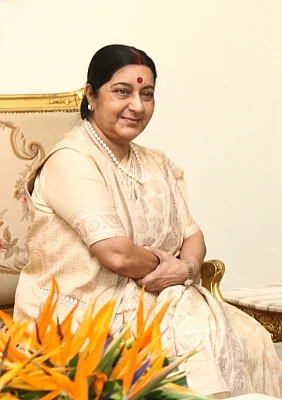New Delhi, Jan 15 (IANS) India has called for a more multilateral global order keeping in focus the Indo-Pacific, a region that has grown in significance in recent years.
Noting that India was committed to upholding multilateralism and the institutions it engenders, External Affairs Minister Sushma Swaraj said on Monday that the world was going through a particularly disruptive phase.
"Technology-driven transformation has further quickened that pace of change," the Minister said while addressing the First Annual Disarmament and International Security Affairs Fellowship Programme organised by the Ministry.
"Many of these changes are marked by rebalancing of the global economy, and consequently, of international politics -- this is especially true of the Asia Pacific or Indo-Pacific region, where India is located."
India, along with the US, Japan and Australia, is part of a quad revived in 2017 that is seeking to work for peace and prosperity in the Indo-Pacific, a region that stretches from the eastern coast of Japan to the eastern coast of Africa.
This is of special geostrategic importance given China's increasing footprint in the region and its belligerence in the South China Sea.
"The only way for us to take advantage of these opportunities so as to ensure sustainable peace and security, is to navigate these disruptions and underlying fault lines through a pragmatic and constructive approach, and most importantly, one that strengthens existing mechanisms of cooperation and helps to foster new and forward-looking partnerships," the Minister said.
"The challenges we all face today, and all of us know this, whether they be the traditional security issues such as nuclear proliferation, armed conflict and so on or newer non-traditional issues such as terrorism, migration and refugee flows and environmental degradation - all of these, in our view, require more, and not less, multilateralism."
Sushma Swaraj said that India's vision of engagement in the Indo-Pacific region will be based on the values of peace, stability and prosperity on a free, open, prosperous and inclusive Indo-Pacific with the Association of Southeast Asian Nations (Asean) regional bloc central to the concept, which serves the long-term interests of all countries in the region and of the world at large.
"There is greater energy, pragmatism and strategic content in India's relations with Southeast Asian regions, known as Asean, in the context of the wider Indo-Pacific.
"We are leveraging the full potential of this policy to accelerate the development of India's northeastern states and to enhance regional connectivity between them and Southeast Asia," she said.
Sushma Swaraj said that the paradox is that globalisation seems to be leading to less, not more multilateralism.
"Or to put it another way, unilateral tendencies are coming to the fore, be they in rising trade protectionism or in the disregard for established international mechanisms governing the global commons such as in maritime domain."
She also highlighted India's revitalisation of ties with its immediate neighbourhood under the Neighbourhood First Policy.
"And this includes a well thought-out approach towards the Indian Ocean region, including maritime security, humanitarian assistance and disaster relief, Blue Economy, as well as the leveraging of the economic and cultural complementarities between the littoral states.
"We are paying special attention to infrastructure and connectivity projects."
The Minister highlighted India's deepening of ties with all the major countries of the world.
The annual programme covers a range of issues relevant to disarmament and international security such as global security environment, weapons of mass destruction, certain conventional weapons, space security, maritime cooperation, security of cyberspace, export controls and emerging technologies.
It aims at equipping participants with knowledge and perspectives on various contemporary disarmament, non-proliferation, arms control and international security affairs.
Young diplomats from 27 countries are participating in the programme, which is being held at the Foreign Services Institute and will conclude February 1.
--IANS
ab/ksk/in/vm
(This story was auto-published from a syndicated feed. No part of the story has been edited by The Quint.)
(At The Quint, we question everything. Play an active role in shaping our journalism by becoming a member today.)
